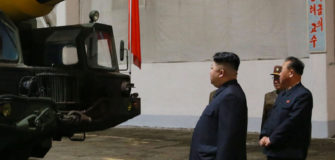Ten Theses on Russia in the 21st Century
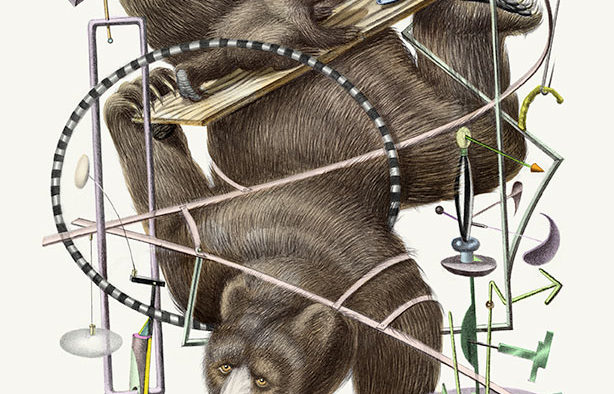
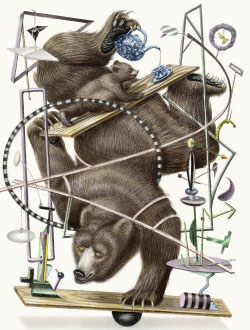 Reflections on hybrid administration, algorithms for exiting the conflict, and how to govern the world’s most complex country
Reflections on hybrid administration, algorithms for exiting the conflict, and how to govern the world’s most complex country
Thesis 1: The future of Russian governance is neither necessarily democratic nor strictly non-democratic. This choice is likely too binary for Russia’s extremely complex realities. Instead, a future Russia may well be – and perhaps should be – decidedly hybrid, drawing promiscuously on the best in 21st century structures and practices from around the world.
Russia is a very young country – even if most people, including many Russians, forget that this Russia, in its post-Soviet incarnation, is only just completing its third decade. It is therefore naturally still solidifying and indeed inventing, improvising and legitimating its governing institutions, not to mention forming (with inconsistent success) its future political elites. The country’s constitutional youth, coupled with its present unique internal and international pressures, means that Moscow can look non-dogmatically westward and eastward alike (and elsewhere besides) to adopt the best in governing approaches, even as it indigenizes these and ends up with its own idiom – as is, by history and mentality alike, the Russian wont.
Let me propose that there are two dominant governing paradigms in the world today – on the one hand, the democratic tradition or, more tightly, what I would call ‘argumentative governance’; and on the other, ‘algorithmic governance.’ Argumentative governance prevails in the presumptive West – the deeply democratic countries of North America, Western Europe and indeed much of the EU, Australia and New Zealand. Algorithmic governance is led almost exclusively by the dyad of modern China and Singapore. Most of the remaining countries in the world – in the former Soviet space, the Middle East (including Israel), the Americas, Africa, and much of Asia (including India) – are still in what might be called the ‘voyeur’ world, still stabilizing, legitimizing or relegitimizing their governance regimes and institutions according to one tradition or the other, or actively borrowing from, and experimenting with, both.
Argumentative (or democratic) governance is characterized by fairly elected governments that are constantly opposed, challenged or corrected by deeply ingrained institutions (like political oppositions, the courts or other levels of government) or broad, activist estates (like the media, the academy, and various non-governmental organizations and groupings, not excluding religious organizations). Algorithmic governance, however, is characterized by the centrality of a smaller, select, highly professional group of national ‘algorithm-makers’ who, having been selected largely through intense filtering based principally on technical and intellectual (and perhaps ideological) qualifications (the so-called ‘smartest people in the room’), are constitutionally and culturally protected in their ability to generalize these algorithms throughout the country over the long run. Algorithmic governance lays claim to legitimacy via the securing of visible, concrete results in the form of consistently rising material wealth, advanced physical infrastructure, and general public order and stability – and indeed the rapidity (and predictability) with which such outcomes are realized and real-life problems are solved.
What would hybrid Russian governance look like in the 21st century? Answer: It would draw on the obvious strengths of the dominant algorithmic and argumentative governance models, while guarding against the major weaknesses of each of these idioms.
Argumentative governance, on the other hand, maintains its legitimacy via procedural argument in the contest for power among political parties, and in the information provided to power through various feedback loops. A large number of these argumentative regimes are federal in nature (just as the number of federal regimes globally has grown markedly over the last couple of decades), and so centre-region relations are both another source of procedural argument and a type of feedback to power (from the local to the general or macro).
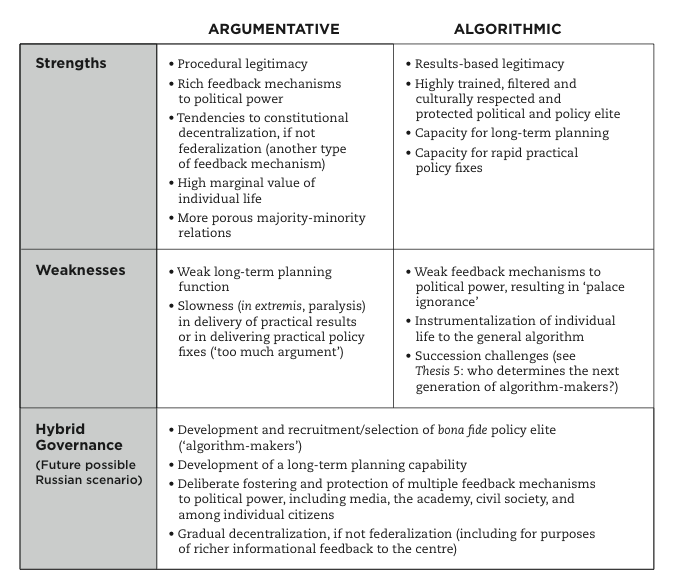
What would hybrid Russian governance look like in the 21st century? Answer: It would draw on the obvious strengths of the dominant algorithmic and argumentative governance models, while guarding against the major weaknesses of each of these idioms. What are the key strengths of the algorithmic system that Russia should wish to adopt? First and foremost, Russia must invest in properly creating, over time (the next 15-20 years), a deep policy elite, meritocratically recruited and trained, to populate all its levels of government, from the federal centre in Moscow to the regional and municipal governments. Such a deep, professional post-Soviet policy elite is manifestly absent in Russia today, across its levels of government – a problem that repeats itself in nearly all of the 15 post-Soviet states.
Second, Russia must develop a credible long-term national planning capability (as distinct from the current exclusively short-term focus and occasional rank caprice of Russian governments, pace the various longer-term official national strategies and documents), led by the said algorithmic policy elite at the different levels of government, and implemented with great seriousness across the territory of the country.
Third, Russia requires an intelligent degree of very gradual decentralization (rapid decentralization being potentially fatal to national unity, or otherwise fragmenting the country’s internal coherence across its huge territory) and, if necessary or possible, a degree of genuine federalization of governmental power across the Russian territory.
Fourth, Russia’s policy elites must foster the development (and protection) of many more feedback mechanisms from citizens to political power in both the federal centre and in regional governments – not for purposes of democratic theatre or fetish, but rather to avoid making major or even existentially fatal policy mistakes, or indeed to correct policy mistakes and refine the governing algorithms in the interest of on-the-ground results and real-life problem-solving (a major imperative in Chinese algorithmic governance today, where the governing elites, as with past Chinese emperors, are, whatever their intellect, said to be excessively ‘far away’). These feedback loops – from the media, the academy, various groups and, evidently, from all Russian citizens – help to ensure that even the smartest algorithm-makers in the future policy elite do not make catastrophic mistakes based on information that is wholly detached from realities on the ground in Russia, across its massive territory.
Uncontrolled or excessively rapid federalization or decentralization, of course, could lead to the breakup of the country or to generalized chaos (a fact well underappreciated outside of Russia) – so strong are the centrifugal and also regionalized ethnic forces across Russia’s huge territory and regional diversity.
Thesis 2: Beyond this decentralization, Russia should ideally federalize substantively, even if the country is already, according to its present constitution, formally federal. At a minimum, as mentioned, the country must before long effectuate a gradual, controlled decentralization. Uncontrolled or excessively rapid federalization or decentralization, of course, could lead to the breakup of the country or to generalized chaos (a fact well underappreciated outside of Russia) – so strong are the centrifugal and also regionalized ethnic forces across Russia’s huge territory and regional diversity. Unintelligent or careless federalization, for its part, could lead to excessive ethnic concentration, to the detriment of the legitimacy of the federal centre in Moscow and the overall governability of the country – including through the destruction of the critical informational feedback to the centre provided by citizens and local governments in decentralized regimes.
Critically, because there is no felt – instinctual or cultural, rather than intellectual – understanding of how federalism works in any of the post-Soviet states – most of which are not only unitary but indeed hyper-unitary states, built on strict ‘verticals’ of power – it is perhaps appropriate (if not inevitable) that Russia should end up, through iteration and trial and error (the only way of doing policy in Russia), with what the Indians call a federal system with unitary characteristics.
Thesis 3: Mentality is critical to the future of Russia. There once was a ‘Soviet person.’ But what is a ‘Russian’ person, mentally, in the post-Soviet context? Answer: He or she is still being moulded. The Soviet collapse left Russians with at least three types of anomie or general disorientation – strategic, moral and, to be sure, in identity. All three species must be reckoned with – not with fetishistic searches for single national ideas, but rather through deliberate investments in real institutions and public achievements, and through long-term, patient investment in the legitimation of these institutions and achievements, both inside Russia and, to a lesser degree, internationally. Indeed, part of this investment and legitimation must involve the fostering of a far deeper and more robust policy culture in Russia’s intelligentsia, among its still-venerable specialists in various professional disciplines, and for its younger people, who are both the future algorithm-makers and drivers of the feedback mechanisms that are essential to the effective governance of the country. Such a policy culture is dangerously underdeveloped in today’s Russia, which militates against effective pivots to either of the argumentative or algorithmic traditions, and indeed against the creation of a uniquely Russian hybrid governance this century.
Russia has an opportunity to play a pivotal role in constructing a wide array of interstitial bridges and mechanisms that would help both to give its strategic doctrines greater and more constructive focus, and to drive the country’s institutional and economic development this century.
Thesis 4: What of Russia and Europe this century? The conflict between the West (especially Europe) and Russia that erupted over Ukraine in 2014 and that endures, without foreseeable resolution and in multiplying manifestations in several geographic theatres, can be properly and fundamentally understood as having originated in what I would call an ‘interstitial problem’ – that is, as the result of two regional regimes and geopolitical gravities (the EU to the west and Russia or, more loosely, the Eurasian Economic Union to the east) pulling ferociously, in opposite directions, on a poorly governed space (Ukraine), with weak institutions and unstable legitimacy at its own centre (the said problem of the ‘youth’ or ‘newness’ of all post-Soviet states). How can this be fixed? Answer: by creating, to the extent possible, a ‘Europe 2.0’ framework that interstitially – and tendon-like – binds Moscow with Brussels, or indeed the Eurasian and European planes, via Kiev. The ‘thickness’ of the binding mechanisms may well be de minimis to start, comprising strictly confidence- or trust-building measures and renewed economic exchange, and evolving over time to bona fide security and political arrangements.
To be sure, with the EU significantly weakened by several concurrent crises (Brexit, refugees, economic stasis, the Ukrainian crisis and Turkish authoritarianism at its borders, the growing presence of Eurosceptic governments on the Continent, and now the Catalan crisis), an emerging strategic perspective from Moscow would seem to be that the ‘European’ option or pivot is now no longer on the table for Russia, even if the vision of constructing a common space between Lisbon and Vladivostok has been, with varying degrees of intensity and coherence, in the strategic psyche of, and expressed in many public statements by, Russian leaders going back to Mikhail Gorbachev (‘Big Europe’) in the late Soviet period through to Vladimir Putin from the early 2000s.
As Europe 1.0 transforms, it seems inevitable that, if peace is to be maintained on the continent, and if Russia is to avoid accidental or even narcissistic isolation and find economic and intellectual openings to Europe, then this Europe 2.0, although facially improbable today, will still have to be ‘invented’ and engineered. As such, there is a distinct strategic opportunity here for Moscow, if it is smart and plays its cards properly, to play a key role in its formulation and erection. Indeed, as Russia, on top of its juxtaposition with the EU, shares borders with several existing, emerging or potential economic and political blocs or international regimes in Asia-Pacific, the Middle East and even, via the melting Arctic, North America (a juxtaposition still underappreciated in North American capitals), Russia has an opportunity to play a pivotal role in constructing a wide array of interstitial bridges and mechanisms that would help both to give its strategic doctrines greater and more constructive focus, and to drive the country’s institutional and economic development this century. Moreover, to the extent that collision between two or more of these international blocs or regimes may, as with the Ukrainian case, lead to conflict – including, in extreme scenarios, nuclear conflict early this century – the opportunity for intellectual and strategic leadership in such interstitial ‘knitting,’ as it were, by Russia assumes a world-historical character.
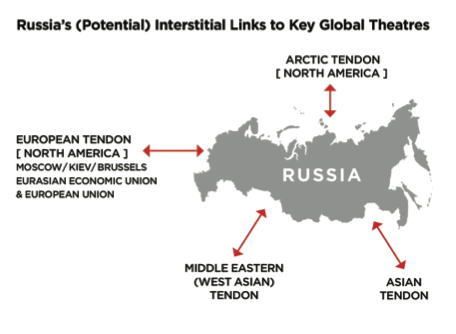
Thesis 5: Russia has a serious succession problem. If this is not negotiated properly and carefully, it could result in civil conflict or chaos, and even the breakup of the country into several parts. (This is a fact that, as mentioned, is deeply misunderstood outside of Russia.) The absence of ‘argumentative’ institutions in Russia, including the peculiar weakness and superficiality of its political parties, means that the identity of, and nature of the contest and process for determining, the next President and other strategic leaders of Russia are not uncontroversially clear. This, again, is not a question of democratic fetish, but indeed one about the ability of the centre in Moscow to project legitimacy across the entire gigantic territory and population of the country. In the absence of a process deemed legitimate and a persona who, in succession to President Putin, is able to command the agreement of the masses to be governed by him (or her), there is a non-negligible risk of civil destabilization of the country. What’s more, should the presidency end more suddenly, for whatever reason, then the country could be seriously destabilized, as the process of relegitimation of the centre in succession will not have been triggered in time.
It is in the interest of Russian leaders to make the succession process extremely plain to the Russian people immediately. It is also manifestly in the interest of outside countries to understand this succession challenge – not least in order to be disabused of any interest in destabilizing the Russian leadership artificially, in the knowledge that a weak governing legitimacy in the aftermath of President Putin (or any Russian president, for that matter) could create not only wholesale chaos in Russia, but indeed major shockwaves in global stability (beginning at Russia’s 14 land and three maritime borders, and radiating outward).
Thesis 6: The creation of a true policy and political elite in the Singaporean or Chinese algorithmic idiom requires significant, long-term investment in education, and the creation of top-tier educational institutions, from kindergarten to the post-secondary levels. The USSR, for all its pathologies, obviously possessed such institutions (including ‘policy’ and administration academies through its Higher Party School). Russia, as a new state, does not. On top of world-class institution-building in education, Russia must, in order to improve the feedback mechanisms of the argumentative tradition, invest in, and deliver, renewed institutions of politics (including federalism), economics (including credible property rights protection), the judiciary (including serious judicial protection of the legitimate constitutional powers of different levels of government), as well as in other spheres of Russian social life (including the religious sphere).
Thesis 7: How to solve the Ukraine conflict and, by extension, Russia’s conflict with the West? We have discussed this extensively in past issues of GB. Moreover, 21CQ has itself, for the last three and a half years, been leading the track 1.5 work around the world, in leading capitals on three continents – from Moscow and Kiev to Paris, Washington, Ottawa and New Delhi – to find ‘exit’ algorithms for this conflict. The recent surge in interest in a peacekeeper-led exit from the conflict has direct roots in 21CQ’s work since the days immediately after the Ukrainian revolution, the Crimean annexation and the start of the Donbass war.
Still, at the time of this writing, I confess that the window for any clean, comprehensive resolution of this conflict may by now have passed (something that both leading Russians and Ukrainians know fairly well, even if some Western analysts may not yet). In 2014 and 2015, a winning algorithm for resolution, in my judgement, would have seen the insertion into the Donbass region (at the ceasefire line and along the Russo-Ukrainian border) of neutral peacekeepers (led by peacekeepers from Asian countries – non-NATO, but also not from the post-Soviet space – that are respected in both Ukraine and Russia), constitutional reform in Ukraine (including possible federalization in toto – recalling the aforementioned need for most post-Soviet states to decentralize or federalize – and/or special status or special economic zones for several regions of the south and east of Ukraine, in concert with the enshrinement of an Australian-style indissolubility clause for the Ukrainian union in the national constitution), and, finally, strong guarantees regarding the permanent non-membership of Ukraine in NATO (including through a possible UN Security Council resolution). These steps would have been accompanied by the removal (at least by the EU) of economic sanctions not related to Crimea.
Today, the paradox of the Ukraine conflict is as follows: Ukraine cannot succeed economically or even strategically without re-engagement with Russia (no amount of Western implication or goodwill will make up for the loss of Russian engagement); Russia cannot succeed (or modernize) economically without the removal of sanctions, and without a deeper reconnection with the EU; and the coherence of Europe suffers for the disengagement and economic weakness of Russia, as well as for the Ukrainian crisis at its borders. No resolution is currently in sight because both Ukraine and Russia remain ‘two houses radicalized’ in respect of this conflict, with key Western capitals not understanding (or believing) sufficiently the finer details of the conflict and its genesis, with Moscow gradually becoming ‘used to’ the economic sanctions and the renaissance of tensions with the West (including in its domestic political narrative), and with the government in Kiev increasingly weak and unstable, and therefore unable either to deliver major domestic reforms or make decisive moves to resolve the Donbass war. In addition, the accelerating disintegration of the Middle East, in Syria and beyond, has grossly complicated any prospects of exit from the crisis – effectively fusing together the European theatre with the Western Asian theatre. (The crisis in North Korea, if it erupts into war, may turn out to be yet another theatre of secondary conflict between Russia and Western countries.)
Leaving aside Russia’s succession issue, there is a clear risk of systemic collapse in one or both of Ukraine (for political and/or economic reasons) and Russia (more likely for economic reasons) in the near to medium term. Collapse of either country’s system would be devastating for both countries, as well as for European and global stability (including in nuclear terms). Ukrainian collapse would accelerate the slide toward direct military confrontation between Russia and NATO.
Only a systemic solution is possible to the conflict, and yet I do not believe that Europe is sufficiently strong and united at present to be able to drive a solution. The US, for its part, is politically unable to relieve Russia of sanctions, and so Moscow will not see much utility in the American play except insofar as Washington can play a role in pushing or incentivizing Kiev to make or not make certain moves. Therefore, the ‘solution’ to the conflict can for now only be partial, rather than general and global. In my assessment, it is Asia – particularly China, or perhaps India – and not Western countries that must play the pivotal role here. (Indeed, Moscow could cleverly seduce both New Delhi and Beijing, geopolitical rivalry between the two oblige, to play co-leads in this partial resolution.) The two key elements of the winning partial algorithm could include:
i. to stop the fighting, neutral peacekeepers from leading Asian countries (starting with China or India, but perhaps also Indonesia and Singapore) and a police or constabulary force in the Donbass region, as well as along the Russia-Ukraine border; and
ii. to rebuild and stabilize Ukraine, reconstitute the Ukrainian-Russian-European relationship (in new, interstitial terms), heavy Russian state reinvestment into all of Ukraine, and, concurrently, heavy Ukrainian reinvestment into all of Russia, with both countries combining economically to rebuild the Donbass in particular – all with significant loan guarantees from the new Asian Infrastructure Investment Bank (AIIB), the new BRICS bank, the Chinese and Indian governments proper, and with opportunistic but possibly subordinate participation by the EU (including through Donbass-specific sanctions relief for Russia), the US, Canada and other units and countries.
Issues like NATO guarantees of non-membership for Ukraine and also the future status of Crimea, as well as global sanctions relief for Russia, all require deep and coherent Western engagement, and so are not on the table for the foreseeable future. The above algorithm also insulates the Ukraine conflict somewhat from the Middle Eastern conflict – or, in other words, delinks, diplomatically, the resolution of the Ukraine conflict from that of the even less soluble Middle Eastern theatre.
Thesis 8: Despite its cultural dynamism and deep intelligentsia, Russia’s economy is unacceptably primitive. Natural resources and energy products will continue to dominate this economy for the foreseeable future, just as they did in the last century – which also makes the national economy and the federal and regional budgets exceedingly vulnerable to significant commodity price swings (with no serious countervailing revenue sources in sight). However, what appears to be missing in Russia today, in addition to proper investment in infrastructure across the territory, is a matching of state purpose, deep entrepreneurial talent, and large-scale venture investment in export-oriented sectors outside of commodities – the predictable result of which is a disproportionate dearth of great, global Russian companies and brands (again, outside of the commodities sector). And so here the model for Russia is likely Israel, from which algorithmic countries like Singapore have borrowed heavily in fashioning their own state-private sector models. Applied to the Russian context, that model would seem to commend two critical reform vectors for Russian industrial policy: first, the creation of a handful of national educational, military or technical-scientific institutions (elite or quasi-elite) that are able to develop an achievement-oriented mindset among Russia’s young adults, as well as lifelong friendships and ‘thick’ professional networks among these people; and second, assurances that the Russian state, with minimal bureaucratic friction, is positively disposed to giving entrepreneurs from the ‘class’ of young achievers passing through these institutions a first contract (procurement), initial funding, or indeed future contracts of scale.
Thesis 9: A key aspect of the argumentative paradigm of governance is that the marginal value of human life is greater in the societal geist of argumentative states than in that of algorithmic states, given the high importance ascribed to procedure and feedback to political power from citizens. This larger marginal value of life is given expression through very robust constitutional and cultural bulwarks for protecting human life, which is viewed in absolute terms. By contrast, algorithmic states, especially of the Asian ilk, may, at least implicitly, attach greater instrumentality to human life – that is, viewing human life as being in the service of, or subordinating to, the preferred Asian freedom: not freedom from government repression, but instead freedom from chaos. The Singaporeans and Malaysians, for instance, refer to the fear of chaos and death, in the Hokkien idiom, as kiasi, in response to which extreme or radical private or public measures may occasionally need to be taken: consider the death penalty or, more commonly, the use of standing emergency laws and measures. An individual life or, short of that, what Westerners view as fundamental rights, may, on this logic, need to be compromised or traded in the service of the more important general protection and freedom from chaos. This may lead to swifter and less compunctious resort to peremptory punishment (like the death penalty) for what might, in the argumentative states of the West, be considered micro-torts (including some drug offences), or to draconian emergency laws and prerogatives in response to perceived threats of a political ilk (including terrorism).
The policy implication for Russia is that the ‘care’ given to each individual Russian citizen (or the value of the individual Russian life) can be improved indirectly or circuitously – that is, that improvement may come not necessarily through direct legislative, regulatory, judicial or jurisprudential changes (and certainly not from well-intentioned rhetoric and nice proclamations), but indeed through investment in some of the ‘argumentative’ institutions themselves – including through improvement of the health and sophistication of the various estates, from political parties to Russian civil society (and even Russian businesses), that provide the feedback from the governed to the governors, thereby removing some of the edge from the bureaucratic leviathan as it touches the human condition in all corners of the country.
On this same logic of increasing the value of individual life, increased investment in argumentative institutions can arguably lead to better, more porous relations between the ethnic Russian majority and the many important minorities of Russia – from the Tatars, Chechens and Ingush, to the Jews, Ukrainians and Armenians.
The key question for Russian statecraft in the early 21st century is whether, allowing for limited corruption as an informal institution, the governing classes can move the country to greater wealth and stability, improving meaningfully and substantially the daily lives of citizens (and the perceived value of those lives).
Thesis 10: Excellent Russian public policy and administration will never wholly eliminate Russian public corruption. Russian corruption – narrowly conceived – can, to a limited extent, be seen as an informal institution of Russian state and society. In this, Russia is not that far removed from many countries and societies around the world, including the more advanced countries of Northeast and Southeast Asia (or also Israel and India). Instead, the key question for Russian statecraft in the early 21st century is whether, allowing for limited corruption as an informal institution, the governing classes can move the country to greater wealth and stability, improving meaningfully and substantially the daily lives of citizens (and, as mentioned above, the perceived value of those lives). Evidently, it would be best to improve the lot of citizens with negligible corruption, as is the standard in the argumentative states of North America or Western Europe. And just as manifestly, it is unacceptable to remain corrupt while the quality of life for Russians stagnates or deteriorates. But the story of leading algorithmic pioneers like Lee Kuan Yew or, on a more serious scale, Deng Xiaoping, is not one of perfunctory non-corruption – as that would likely remove all lubrication from the administrative system, institutional inertia oblige – but instead public achievement and policy-administrative delivery to citizens in the context of significant corruption that, over time, enjoys a demonstrably downward trajectory.
The paradox of Russian public administration as it applies to matters military versus non-military is instructive in this regard. In Russia, short-term military or emergency orders or decrees (or algorithms) are typically dispatched with remarkable rapidity and efficacy (demonstrating a prodigious national organizational ability to scale very quickly). And yet long-term plans and projects (including military procurement) are delivered with notorious inefficiency, slowness and procedural corruption. For these long-term projects, presidential decrees are issued, with considerable regularity, even to repeat or remind the bureaucratic system about the existence of still-unfulfilled past presidential decrees. Quaere: What type of strategic, policy and administrative seriousness and quality would Russia need to be able to deliver on the long term but prosaic with the same inspiration with which it delivers on various emergency prerogatives? Can the country maintain its focus (and cool)? Can it develop a professional leadership class across the country, at different levels of public power, that has a ‘synoptic vision’ that is sufficiently vast to incorporate Russia’s endless complexity while constantly iterating and refining this vision through citizen input and feedback? Can this class of people both populate and in turn discipline the administrative apparatus of the state? And, whatever the compromises it may require en route, can it deliver the goods for the Russian people?
Irvin Studin is Editor-in-Chief & Publisher of Global Brief Magazine.









